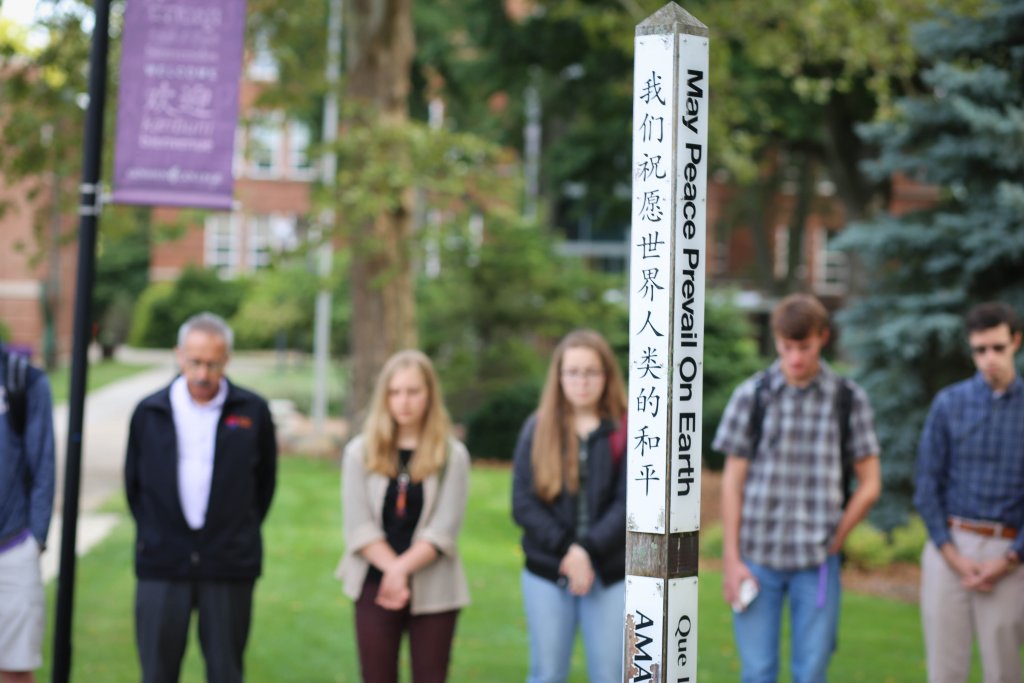Leave a Lasting Legacy Through an Endowed Gift
“The true meaning of life is to plant trees, under whose shade you do not expect to sit.” – Nelson Henderson

Our personal legacies are often difficult to fathom and even harder to measure. When we stop to think about the good we have done, thoughts may turn to family and those we love and serve. Still, it is hard to know how far the rings will travel out from the handful of pebbles we threw in the big pond.
Some among us are more intentional about building a lasting legacy. These thoughtful and passionate donors invest in that which is important to them and give of their time, their wisdom, and their resources. For those investors who believe strongly in the mission of an institution like Goshen College, a gift of endowment is particularly rewarding. A gift of endowment is a gift that lasts. It is, by design, a gift that creates a permanent source of support for the mission that will be there long after the giver is gone. In this sense, those who build a legacy through endowment plant trees that bloom new again and again; trees whose shade many generations to come will enjoy.
Jump to:
» How Your Gift to Endowment Benefits Goshen College
» Establishing a Named Endowment by Will
» Using Retirement Accounts to Fund Estate Gifts
» Establishing a Named Endowment Through a Life Income Plan
Endowment: Definition, Purpose, and Function
By definition an endowment fund is a permanent investment account which produces earnings that are used for purposes that could include helping a nonprofit meet annual operating expenses, supplement targeted programs and services, and make possible activities that enhance the overall quality of the institution. Endowed funds provide a financial cushion for today as well as tomorrow. Endowed funds also afford greater financial independence and less reliance on annual revenue streams to support operating expenses.
A substantial endowment helps Goshen College ensure that funds will be available to assist deserving students in receiving the benefits of our unique, excellent education in perpetuity. A portion of the gain and earnings derived from the invested funds that comprise the Goshen College endowment are used each year in accordance with the endowment spending policy established by our Board of Directors. Typically, what we re-invest in our mission from endowment earnings is less than the fund’s total earnings (including unrealized gains) each year. The undistributed earnings are retained in the endowment, which allows the fund to appreciate over time with the objective of maintaining its value against inflation.
Portions of the Goshen College endowment have been designated by donors for a specific use; the remainder is unrestricted, and the income is used to meet a variety of institutional needs. In addition to being carefully managed according to a written investment policy, our endowment fund has grown over time primarily through bequests, remainder interests in charitable trusts, charitable gift annuities, IRA or other retirement distributions, life insurance, and other estate-related gifts. The current market value of our endowment is about $120,000,000.
Giving to endowment remains a popular option for friends of Goshen College because it is an ideal method for ensuring that programs they have helped to underwrite continue to receive an appropriate level of funding now and in the future. Some of our donors have chosen to build endowment funds by contributing gifts during their lifetime – as a single gift, multiple gifts over a period of years, or a combination of outright and estate gifts. These funds bear the names of the donors, their family members, or close friends and serve to honor or memorialize these individuals.

How Your Gift to Endowment Benefits Goshen College
The work of Goshen College benefits in a number of ways from gifts to establish named endowment funds with restricted or unrestricted purposes. Depending upon your interests and financial ability, endowed funds can help achieve the following objectives.
- Endowed Scholarship Fund: A scholarship fund permits students to pursue courses and other programs at a time when they and their families find it difficult to afford access to an excellent Goshen College education. A minimum philanthropic investment of $50,000 will establish a named scholarship fund. You, the donor, indicate the criteria for awarding the scholarship to a student or students each year. For instance, you may establish criteria for the scholarship to include majoring in certain fields or being involved in certain co-curricular areas.
- Endowed Department Chair/Professorship/Program Director: A donor designated endowed department chair/professorship/program director fund provides annual income to support an outstanding department chair, scholar or professor. This is an ideal way to ensure excellence in the field that will directly benefit Goshen College students. A minimum investment in the range of $1,500,000 to $2,000,000 will establish such funds. There are currently six department chair endowments already in existence, all of which need additional funding. You could decide to add to one of these.
- Endowed Equipment or Technology Fund: This type of fund provides, on an annual basis, the resources to acquire the latest in equipment or technology upgrades for a specific department or for general needs identified by Goshen College. These funds can also be established with a minimum of $50,000. For example, the science departments are in constant need for upgraded equipment and an endowed fund to help meet this needs would be most beneficial.
- Endowed Program – This type of fund underwrites current programs, initiatives or departments. The amount needed to endow a specific program or department varies, depending on the number of faculty, students enrolled, etc.

These are but a few examples of named endowed funds that may be established at Goshen College. There may be others of particular interest to you. For example, you may wish to direct your gift to unrestricted endowment, thus providing the Board of Directors and the administration maximum flexibility in addressing the institution’s needs. We would be pleased to visit with you regarding how an endowed fund might be established through a current or planned gift to Goshen College.
Establishing a Named Endowment by Will
While Goshen College has donors who are providing current gifts to endowment, many of our supporters consider leaving endowment support as a final legacy gift to the College. These friends work with us and their advisors to create a special endowment support provision for the institution through an estate plan.
For example, the easiest way for you to make an estate gift to endowment is by a bequest in your will or trust. Your attorney can assist you in choosing the appropriate wording for your particular circumstances in order to accomplish your wishes. You (or your attorney) should also talk with us at Goshen College prior to executing your will or trust, in order to assure that the provisions governing the endowment are consistent with Goshen College’s policies and practices regarding the management of endowed funds.
Here is some sample wording for review by you and your attorney:
- Unrestricted Bequest to Endowment: I give % of my estate (or the sum of $_________) to Goshen College, Inc., 1700 S. Main St., Goshen, IN 46526 to be added to the general endowment fund, the income of which will be used for the institution’s purposes as determined by its Board of Directors and administration.
- Restricted Bequest to Endowment: I give to Goshen College, Inc., 1700 S. Main St., Goshen, IN 46526 % of my estate (or the sum of $________), to establish the _____(name) _________ endowment fund, the income of which will be used for ___________ (purpose) . If in the opinion of the College’s Board of Directors and administration it becomes impractical or inadvisable to use the fund for such purpose, the Board may apply the fund to another purpose, taking into consideration my intentions as expressed above.
- Bequest of Residuary Estate: I give the residue of the property owned by me at my death, both personal and real and wherever located, to Goshen College, Inc., 1700 S. Main St., Goshen, IN 46526 to establish the (name) endowment, the income of which will be used by the Board of Directors and administration for ___ (purpose) ___ . If in the opinion of the College’s Board of Directors and administration it becomes impractical or inadvisable to use the fund for such purpose, the Board may apply the fund to another purpose, taking into consideration my intentions as expressed above.
- Specific Bequest: I give the following property to Goshen College, Inc., 1700 S. Main St., Goshen, IN 46526, to establish the (name) endowment, the income of which, will be used for the institution’s general purposes as determined by its Board of Directors: (describe the property — i.e., collection of rare coins, real estate, artwork, jewelry, etc.)
- Contingent Bequest: I give the residue of the property owned by me at my death, both personal and real and wherever located, to my spouse (or some other designee), if she/he survives me, or if she/he does not survive me, to Goshen College, Inc., 1700 S. Main St., Goshen, IN 46526, to establish the (name) endowment, the income of which will be used for the institution’s general purposes as determined by its Board of Directors and administration.
Property passing to Goshen College, Inc. under any of the above forms of bequests in your will would qualify for the estate tax charitable deduction, and as such would not be subject to estate taxes.

Using Retirement Accounts to Fund Estate Gifts
If you have assets in retirement accounts such as an IRA, 401(k), 403(b), Keogh, and other corporate or partnership pension and profit sharing plans, there may be significant tax advantages in bequeathing all or a portion of these accounts to Goshen College. If retirement accounts are designated for heirs such as children and grandchildren, over one-half of the total value of the account could be lost to federal income and estate taxes (depending on the applicable income tax and estate tax rates), not including the impact of state taxes. Because of the heavy tax burden when bequeathing tax-deferred retirement accounts to family members other than a spouse, it is usually tax advantageous to designate these types of accounts to Goshen College and designate other assets such as appreciated securities or real estate to family members or other heirs.

Establishing a Named Endowment Through a Life Income Plan
It is possible to fund a named endowment while deriving income from the gift during your lifetime. Through charitable gift annuities and charitable remainder trusts funded with cash or other property, you may provide for an endowed gift at death while also providing lifetime income for you, your spouse, or other family members.
Especially during times when traditional investments are producing modest or even volatile returns, establishing a charitable gift annuity would enable you to provide for an endowed gift while also allowing you to receive a guaranteed annual income distribution for the remainder of your life (or life of your spouse or other family member). A portion of the principal used to fund the annuity is tax-deductible in the year it is given. The income you receive is based on your age (and the age of any other income beneficiary). In addition, a percentage of the annual income is considered a return of principal and is tax-free.
If you wish to use appreciated securities or other appreciated property to establish your named endowment, you may wish to consider the advantages of a charitable remainder trust of which there are two types — the unitrust and the annuity trust. With the unitrust, you receive income each year based on a percentage of the value of the principal of the trust (which is fixed when the trust is established), as revalued annually. If you want to add to the unitrust at a later time, you may do so without creating additional trust instruments. An annuity trust is much the same as the unitrust, with the exception that the income amount established when the trust is formed does not change. Additional gifts cannot be made to the annuity trust.
In each of these life income plan examples, you may direct that the remaining principal of the annuity or trust be used to create a named endowed fund at Goshen College when you (and your spouse or other income beneficiary) pass away. Depending on your financial circumstances, the funds passing to Goshen College may be funds that otherwise would be subject to estate taxes. Accordingly, creating a charitable trust or an annuity trust may not greatly reduce the total value of the property interests passing through your estate plan to children or other beneficiaries.




